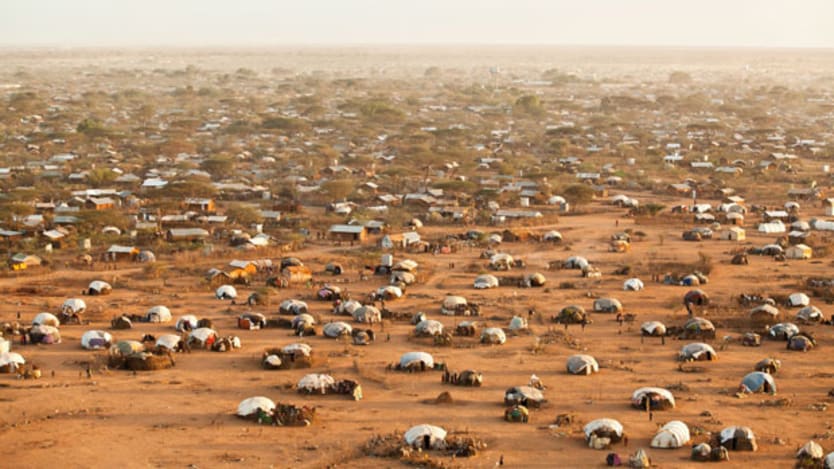
The Dadaab camp in Kenya, considered the largest refugee resettlement site in the world, has been expanded and is not as overcrowded as it used to be — but that could soon change if a new government directive to make all refugees living in the cities return is not repealed.
On Tuesday, Kenya’s interior ministry issued a public directive calling on all urban refugees to return to the Dadaab and Kakuma camps located near the country's borders with Somalia and South Sudan, respectively. The order asks Kenyans to report to authorities “any refugee and/or illegal immigrants found outside the designated refugee camps,” underlining the importance of their cooperation.
“Security is a shared responsibility and citizens should cooperate with law enforcement agencies at all times,” says the directive signed by cabinet secretary Joseph Ole Lenku.
The order follows the church attack in Mombasa on Sunday that resulted to the death of 6 people, an incident that gave authorities new fodder to again push its agenda in relocating refugees. In 2012, the Kenyan government issued a similar appeal, asking aid groups to “transfer” all their refugee assistance programs in the camps, help move all refugees back to the camps, and eventually repatriate them.
Several nongovernmental organizations and individual refugees have petitioned the justice system to halt the directive’s implementation, while Kenya’s high court ruled that the plan undermines the rights of refugees and violates their freedom of movement.
But now, the threat is once again upon them, raising renewed concerns among refugee-focused groups.
“We understand their security concerns, but at the same time it’s important to respect refugees’ rights and not to stigmatize them. Refugees cannot be considered all terrorists, and we do think that there are ways of both safeguarding the security of the country and respecting refugees’ rights,” U.N. High Commission for Refugees spokesperson Fatoumata Lejeune-Kaba told Devex.
The U.N. agency is currently in talks with the Kenyan government, attempting to persuade it to reconsider its decision. It's unclear to UNHCR how the government intends to carry out the order — for instance, whether it will apply even to refugees with stable jobs who have settled in Nairobi, Mombasa and other cities.
“We know the declaration is saying that everybody should go. But obviously if people have settled in any area, have run their businesses or when children go to school and they have a normal life, if you move them elsewhere you are disrupting their lives — and that's one of our concerns,” Lejeune-Kaba said.
Overcrowded camps, donor silence
There are currently more than 50,000 refugees residing in Kenya’s urban centers.
Most of them are Somalis, although there are also large numbers hailing from other neighboring nations such as Ethiopia, Sudan and the Democratic Republic of the Congo.
The Kakuma camp currently hosts more than 150,000 refugees, many of them from neighboring South Sudan — well beyond the camp’s originally intended capacity of 50,000. But room for them in the camps is not really the issue — at least in the case of Dadaab, Lejeune-Kaba said.
“The problem of overcrowding in Dadaab is no longer the issue, because the numbers have gone down and we've had more land ... so if we're talking strictly about capacity, technically they can all go to Dadaab,” she said. “But we don't want that. We want them to enjoy their freedom of movement and we want them to have the right to remain where they are, where they have settled, where they have jobs, where they have a life.”
Instead of pushing refugees into camps — which so far has not happened yet, with registration centers in Nairobi, Mombasa, Malindi, Isiolo and Nakuru still open, according to Lejeune-Kaba — UNHCR advocates for improved refugee registration, which the spokesperson said is “better security” as the government would know exactly who the refugees are, where they are staying, why they came and what they are doing.
But at present, their actions appear limited to advocacy work.
Other organizations, such as Human Rights Watch and Refugees International, have condemned the government's decision and called on donors to do something about it.
“Kenya has signed international conventions that allow freedom of movement for refugees, and Tuesday’s decision flies in the face of those assurances ... If implemented, Kenya’s moves would set a dangerous precedent that could endanger millions of people,” said RI, while HRW wants donors to “encourage Kenya to abandon the plan.”
For now though, the government is keeping its own counsel.
Read more development aid news online, and subscribe to The Development Newswire to receive top international development headlines from the world’s leading donors, news sources and opinion leaders — emailed to you FREE every business day.
